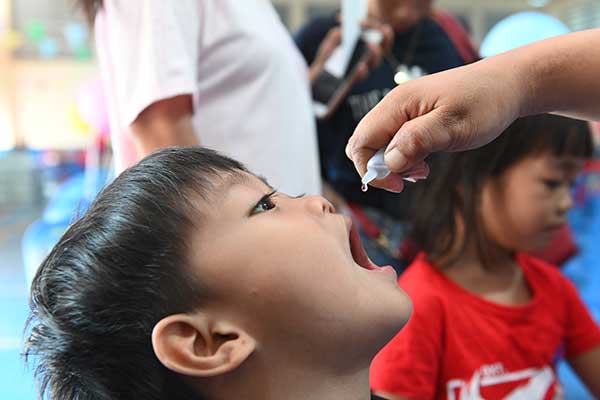
By Francis Allan L. Angelo
The Philippines is no longer among the top five countries with the highest number of unvaccinated children, according to data released by the World Health Organization (WHO) and UNICEF on World Polio Day, October 24.
The significant achievement is attributed to strengthened efforts in community and school-based immunization programs, which have helped lower the number of zero-dose children from 1 million in 2020-2022 to 163,000 in 2023.
“UNICEF commends the Philippine government’s steadfast dedication to leave no child behind. Its decisive leadership and immediate prioritization of immunization have reaped promising results,” said UNICEF Philippines Representative Oyunsaikhan Dendevnorov.
From 2020 to 2022, the Philippines was ranked fifth globally in terms of the highest number of unvaccinated children. However, WHO/UNICEF’s 2023 Immunization Coverage Estimates show that the country is no longer part of the top 20, reflecting a dramatic improvement.
In addition to community outreach, a school-based immunization initiative successfully vaccinated 4.8 million children in public schools against diseases such as measles, rubella, tetanus, diphtheria, and human papillomavirus.
However, challenges remain.
Despite this progress, the WHO’s Polio Risk Assessment for 2022-2023 still classifies the Philippines as a high-risk country with 36 weighted risk points—only a slight improvement from the previous score of 39.
The country’s most recent polio outbreak, which began in 2019, was declared over in 2021.
“Vaccination remains our strongest armor to protect children for life,” said WHO Representative Dr. Rui Paulo de Jesus. “Together with the Department of Health and partners, our goal is a country and a world where no child is ever paralyzed by polio again.”
The Philippines also faced outbreaks of pertussis and measles earlier this year, particularly in the Bangsamoro Autonomous Region in Muslim Mindanao.
These incidents highlight the ongoing struggle to raise vaccination rates across the country. As of 2023, only 62% of eligible children are fully immunized—up slightly from 60% in 2022.
The UN agencies emphasized that ending outbreaks of vaccine-preventable diseases, such as polio, pertussis, and measles, requires an immunization coverage rate of 95%.
Despite falling short of this target, the reduction in zero-dose children is seen as a positive step toward achieving long-term health goals.
UNICEF said it continues to support the Philippine government by investing in health systems, addressing supply chain issues, training healthcare workers, and building partnerships to enhance the country’s immunization programs.




















